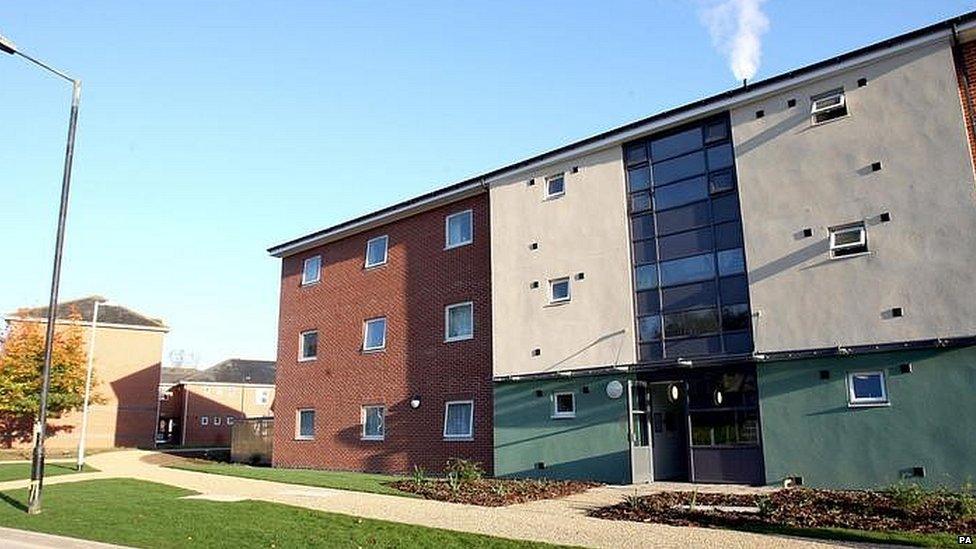John McDonnell 'would bring existing PFI contracts in-house'
- Published
- comments
John McDonnell: "It's what you have been calling for. We will bring existing contracts back in-house."
A future Labour government would bring "wasteful" PFI contracts back in the public sector, shadow chancellor John McDonnell has said.
He told Labour's conference the contracts were set to cost the taxpayer £200bn over coming decades and private companies were making "huge profits".
He said Labour, which has previously promised to strike no new deals, would bring PFI contracts "back in-house".
Labour sources later said this meant they would "review" all PFI contracts.
This means it is not clear whether all existing PFI contracts would be taken back - although shadow chief secretary to the Treasury Peter Dowd told the BBC's Daily Politics he expected the "bulk" to "come back in".
The PFI model of funding public services such as new schools and hospitals was pioneered by the Conservatives in the 1990s and has continued under successive governments.
But Mr McDonnell told activists in Brighton that it was draining the public sector of resources and its time was at an end.
"The scandal of the Private Finance Initiative has resulted in huge long-term costs for taxpayers while providing enormous profits for some companies," he said.
"Over the next few decades, nearly £200 billion is scheduled to be paid out of public sector budgets in PFI deals. In the NHS alone, £831 million in pre-tax profits have been made over the past six years.
"Never again will this waste of taxpayer money be used to subsidise the profits of shareholders, often based in offshore tax havens."
He added: "We have already pledged there will be no new PFI deals signed by us in government. But we will go further. It is what you have been calling for. We will bring existing PFI contracts back in-house".
The BBC's assistant political editor Norman Smith said such a move would "end the 25-year consensus" on using the private sector to fund major projects but to do so would require a "massive" compensation bill and it was not clear where the money would come from.

What is PFI and how prevalent is it?

PFI-funded projects range from hospitals and waste facilities to army barracks
PFI is a way of financing investment in public infrastructure using private capital.
Private firms stump up the cost of building facilities - such as a hospital or school - and, in return, the state makes payments over a period of time - often about 25 years - for their use and management.
The model has been attractive to governments of all political persuasions as it limits upfront capital expenditure and reduces risk while future payment obligations do not count towards the national debt. However, its value for money has long been questioned.
As of March 2016 there were 716 PFI projects, 686 of which were still operational, external. The others had either been cancelled or had reached the end of the contract period.
The SNP government stopped new PFI contracts when it came to power in Scotland, replacing them with NPDs (non-profit distributing projects).

One leading economist, John Appleby, from the Nuffield Trust, told the BBC that the NHS alone was repaying private firms about £2bn a year for PFI schemes and the cost of interest payments for completed projects was likely to total £56bn by 2048.
But he added: "The trouble with these kind of announcements is the fine print of the details. Taking them back into public ownership does not come free. The money will have to come from somewhere."
But Dave Prentis, from Unison, welcomed the move - saying that although there would be a cost to buying out the contracts it would still be "better value" for the taxpayer than letting them continue for the next 20 years.
Mr McDonnell said Labour had proved doubters wrong by making gains in June's snap election and its goal was to get into power, "rescue" the UK from austerity and "set the political agenda for a generation".
"We have proved we are an effective campaigning party," he said. "We now have to prove we will be an effective governing party."
He promised to bring "ownership and control of the utilities and key services into the hands of people who use and work in them - rail, water, energy, Royal Mail - we're taking them back".
'Misplaced nostalgia'
Carolyn Fairbairn, director general of the employers organisation the CBI, said Mr McDonnell's plans on nationalisation and PFI were "the wrong plan at the wrong time".
"Forced nationalisation of large parts of British industry will send investors running for the hills, and puts misplaced nostalgia ahead of progressive vision," she said.
And the Conservatives said Labour's promises were "unaffordable" and would not improve public services.
In his speech, Mr McDonnell also promised legislation limiting the amount of interest that can be charged on credit card debts, which he said would ensure no-one would pay more than they borrowed in the first place.
Labour said the proposals would work in a similar way to measures on payday loans, which came into force in 2015, and help people trapped in a "persistent debt spiral".
UK Finance, which represents the financial and banking industry, said it was committed to responsible lending and "the last thing the industry wants is to see those who are most vulnerable being pushed towards the hands of unscrupulous and unregulated lenders".